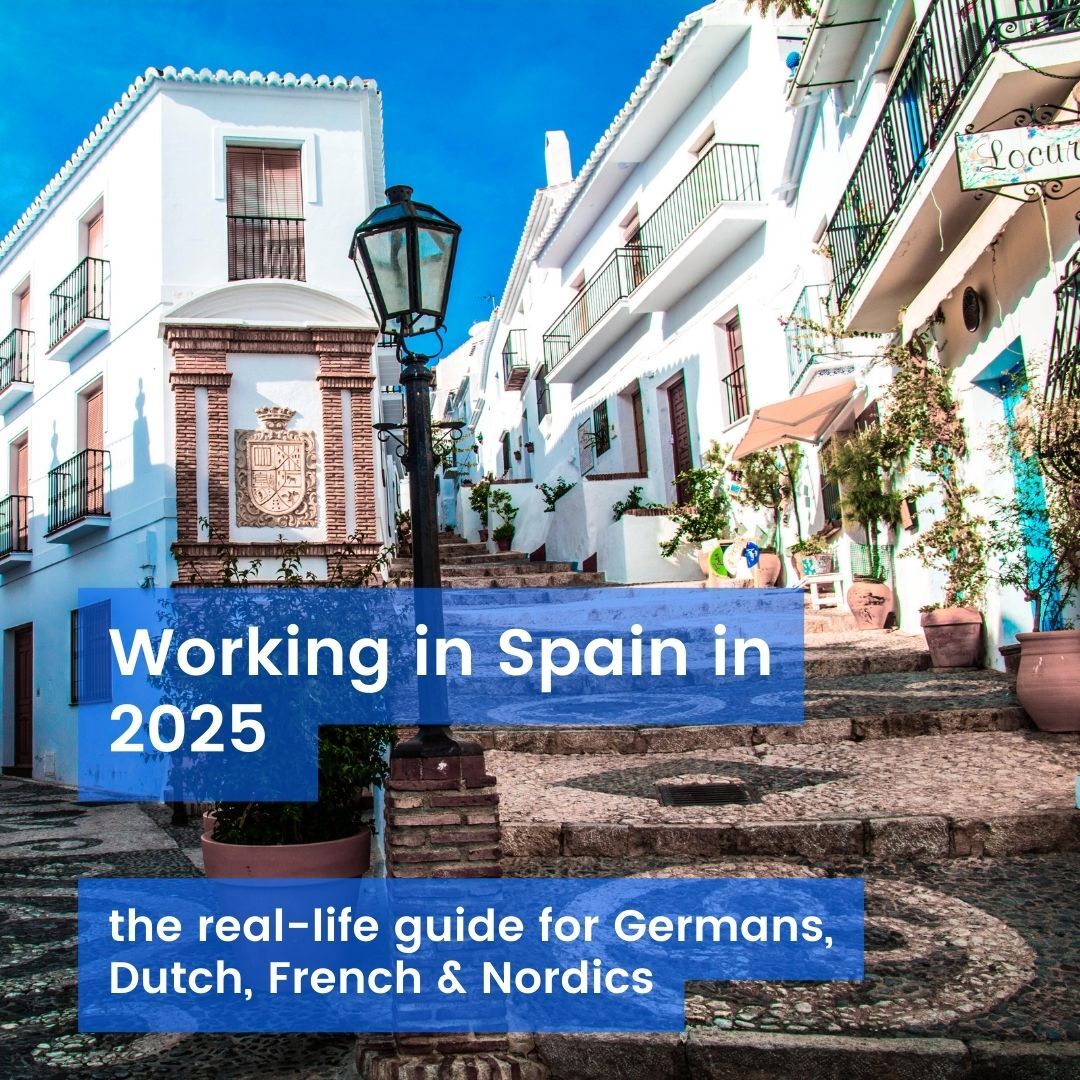Working in Spain in 2025 — the real-life guide for Germans, Dutch, French & Nordics

(By Karolina, recruiter at CityJobOffers)
I’m Karolina. I’ve walked hundreds of candidates from their first “Should I really move?” to signing day in Barcelona, Madrid, Valencia or Málaga. This isn’t theory—it’s the pattern I see every week when German, Dutch, French and Nordic speakers land their first role in Spain and want the move to feel smooth, not chaotic.
1) What EU/EEA citizens actually need (and how to make it painless)
You don’t need a work visa if you’re an EU/EEA citizen (DE, NL, FR, SE/DK/NO/FI, etc.). You do need the admin basics:
-
NIE number for contract, bank and taxes. Book the appointment early and prep documents before interviews finish—doing it in parallel keeps your heart rate down.
-
Social Security number (NUSS/NAF). Many employers register you, but I prefer you know how to do it yourself so payroll works on Day 1.
-
EU/EEA resident registration if you’ll stay longer than 90 days. Think: appointment + ID + proof you’re working or have means.
How I run it with you: we build a micro-timeline (“Week 0: screening; Week 1: NIE appointment requested; Week 2: Social Security form ready”). Result: on Day 1 you’re signing, not sprinting.
2) Where the jobs actually are—by language
Spain’s service economy is buzzing, but here’s the reality I place people into:
-
Customer Support / BPO (English + your native language)
-
German speakers: the DACH queues are busy year-round; strong QA/Trainer/Team Lead pathways.
-
Dutch speakers: consistent demand; quick start dates and language bonuses are common.
-
French speakers: bilingual squads (FR+EN) in Barcelona and Valencia are very active.
-
Nordic speakers (SE/DK/NO/FI): smaller cohorts, but teams value clarity and quality—bonuses can reflect that.
Cities I see again and again: Barcelona, Madrid, Valencia, Málaga.
-
-
IT/AI, e-commerce, energy, healthcare
These grow alongside support: roles for analysts, content quality, trust & safety, and junior tech tracks. If you bring service mindset + native language, training lifts you quickly.
3) Pay, “12 vs 14” payments, and a first-month budget that actually works
Spain often pays either 12 times (bigger monthly) or 14 times (two extra payouts, typically summer/December). I go line-by-line with you: base salary, language bonus, variable pay, meal/transport perks.
We also build a first-30-days budget together: deposit + rent, admin costs, SIM + transport card, and a small “surprises” cushion. Spain can be cheaper than home—until daily coffees by the beach add up. Plan it, enjoy it.
4) Schedules & culture—forget the myths, plan the rhythm
The classic long-lunch “siesta” day exists in traditional sectors, but most modern offices and support centers use continuous schedules or rotating shifts. Be honest with yourself about evenings/weekends before you sign. If rotation is part of the role, I call it out early—no sugar-coating.
5) The two-week move plan (yes, it’s doable)
-
Week 1: screening with CityJobOffers, first interviews, NIE appointment requested, shortlist of neighborhoods/rooms.
-
Week 2: offer + pre-onboarding, Social Security check, flight/train booked, temporary room secured, EU/EEA registration docs packed.
Day 1: badge, onboarding, meet your supervisor… and yes, a quick walk by the sea or old town if that’s your thing.
6) Coming with a partner or friend
-
EU/EEA partners (e.g., French + Swedish couple): same freedom of movement logic; we sync timelines so you settle together.
-
Non-EU partners: there are legal routes via employment sponsorship or remote-work paths. We map what’s possible now and what’s a later step. The point is one plan, not two separate spirals.
7) Country-by-country notes (from my calls)
-
Germans (DE/AT/CH): your process instincts are a superpower—use them. We’ll nail down start week, shift transparency, and the exact wording in the contract (12/14 payments, bonuses, notice periods).
-
Dutch (NL/BE): flexibility + strong English usually means a fast track to offer. Don’t underestimate how quickly you can move—book that NIE slot early.
-
French (FR/BE): bilingual teams love your clarity with customers; we’ll prep a crisp “style of support” story for interviews (structure + empathy).
-
Nordics (SE/DK/NO/FI): your communication style fits quality-first teams; training is usually in English while your queue is your native tongue. Expect smaller teams, tight culture, and good knowledge sharing.
8) What City Job Offers actually does for you
My job isn’t “Congrats, you’re hired! Bye.” My job is making sure your first 30 days set you up for the rest:
-
I match you on team culture + language (not just keywords).
-
I align a realistic start week with your paperwork timeline.
-
I decode the contract (12/14 payments, bonuses, shifts) with you.
-
I share a neighborhood short-list and a first-month budget sheet.
-
And I stay reachable after you start—because the first month decides everything.
Mini-FAQ
Do I need Spanish?
For many support roles: no. English + your native language is the key. Spanish helps your social life and opens internal mobility later.
How fast can I start?
Commonly 2–4 weeks from first call to Day 1, if you follow the timeline.
Can I switch teams later?
Yes—common growth paths are QA, Trainer, Workforce, Team Lead, or lateral moves into ops or content quality.
Housing? Pets?
Rooms are fastest to secure for month one; pet-friendly apartments exist, just ask me for the vetted list.
Final note from Karolina:
You’re not just moving to a country—you’re stepping into a chapter. My role is to make the first pages solid so the rest of the story is yours to write.


